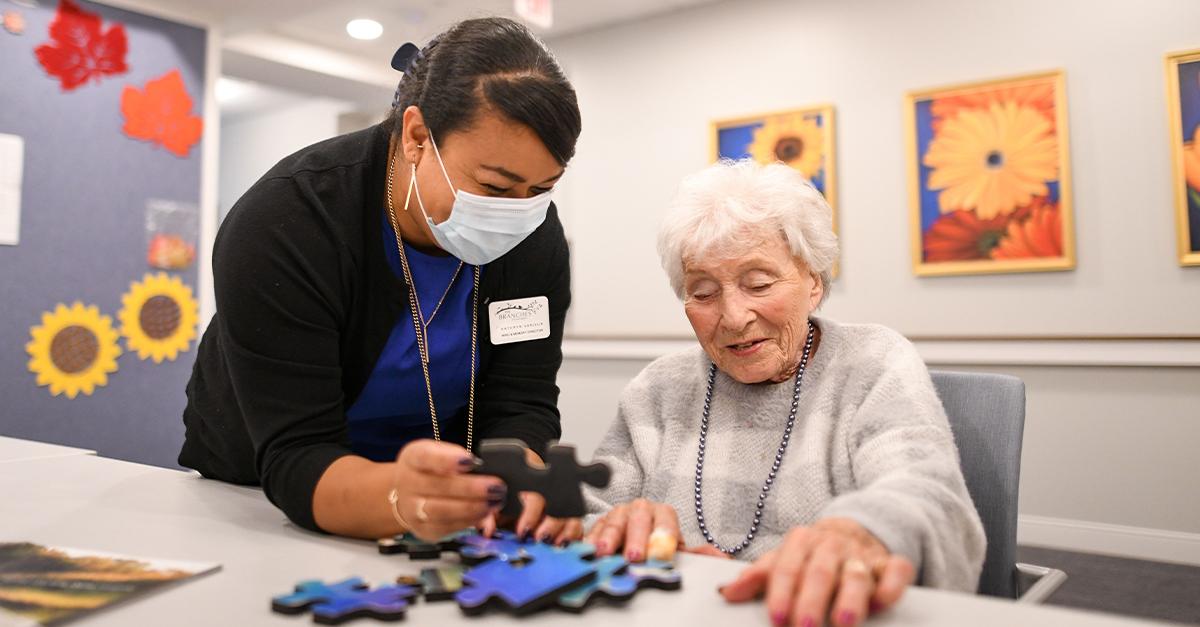Key Components to an Advanced Dementia Training Program

It’s one thing to be aware of the signs of Alzheimer’s disease and dementia and how it can impact a person’s quality of life, but it’s another to actually have the skills to support and care for those who live with these and other cognitive challenges. That’s why from February 14–21, we observe Alzheimer’s Disease and Dementia Care Staff Education Week. Established by The National Council of Certified Dementia Practitioners (NCCDP), the purpose of this week is to empower and help keep all caregivers and healthcare workers up to date on the latest ways to treat and support those living with Alzheimer’s and dementia.
When it comes to the wellbeing of our Mind and Memory Care residents, the way we train our associates is a vital piece of the equation at Benchmark. Here’s a closer look at our approach.
Our training process focuses on state regulation requirements, as well as the NCCDP’s recommendations. In addition to training Mind and Memory Care associates, our new resident care associates complete dementia training and an immersive dementia simulation experience, as well as ongoing education. Our hospitality associates, like servers and dining staff who interact with residents on a daily basis also receive additional training. “The advanced dementia training we offer at Benchmark takes the associate from an increased knowledge of dementia types and stages to the ability to practice skills and approaches individualized for each resident,” says Michelle Tristani, Corporate Director of Memory Care at Benchmark Senior Living, who also hosts routine Behavioral Huddles, a dementia learning series where associates are encouraged to ask questions and discuss real-life case studies.
Our Benchmark Connect First training program is designed to prepare our caregivers with effective communication strategies, both verbal and nonverbal because communication occurs in more ways than just speech. Connect First prioritizes establishing a positive human connection before associates begin to interact or engage with residents living with dementia. Our associates learn how to utilize certain body language techniques and nonverbal cues to help facilitate successful interactions. Training this way teaches our associates how to communicate with residents not just through words, but through the tone of voice they use, eye contact, facial expressions, gestures, and touch. Developed with a partnership-based care philosophy, Connect First also incorporates safety training, as well as dementia expert Teepa Snow’s Positive Approach to Care.
In our approach to dementia care, we emphasize the importance of always utilizing whichever form of communication is the most appropriate. Where one resident responds best to verbal cues, another might respond better to physical gestures and body movement. We make sure our care is tailored to what each resident needs and reacts best to. “The goal of our comprehensive Mind & Memory Care training is for the associate to be successful in each of their interactions with our residents. We arm associates with the information and knowledge on approach and communication skills to engage a resident with varying cognitive skills,” says Nancy Harper, Benchmark’s Director of Learning and Development.
Why does this individualized approach to care matter so much? The way we communicate with residents can have a profound impact on them: “When associates have this knowledge, they’ll be successful in encouraging and empowering the resident to have moments of small wins, such as the ability to independently put on their blouse or to assemble a craft. Maintaining their self-worth is crucial to a resident with mind and memory difficulties,” Harper remarks.
Furthermore, our training approach is both immersive and ongoing. We make it a priority to provide as many hands-on training opportunities as possible throughout the year. Throughout the year, we also offer the opportunity for any of our associates to complete their Alzheimer’s Awareness Certification on Habilitative Therapy, which includes a 12-hour class and a certification exam.
Ultimately, our approach to Alzheimer’s and dementia training comes down to one thing: how we can best serve our residents. Learn more about our Mind and Memory Care neighborhoods below.


